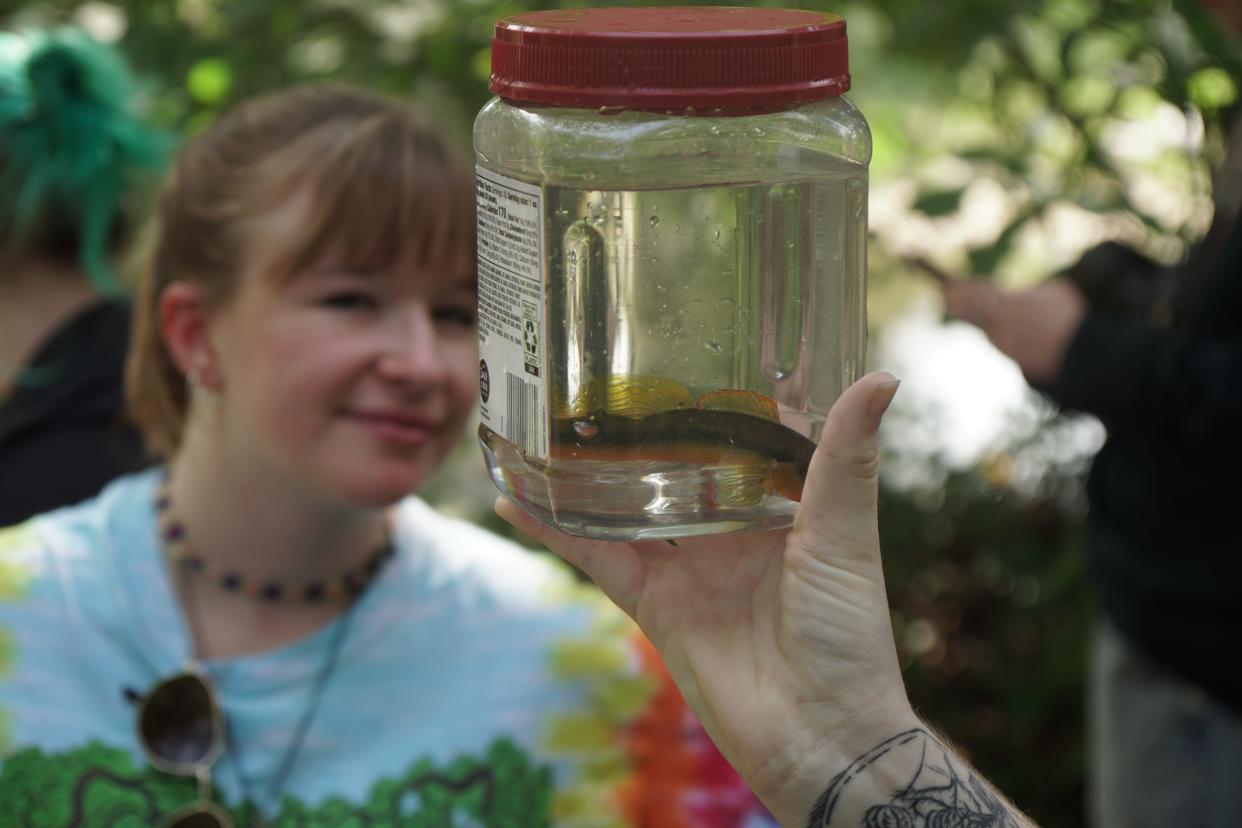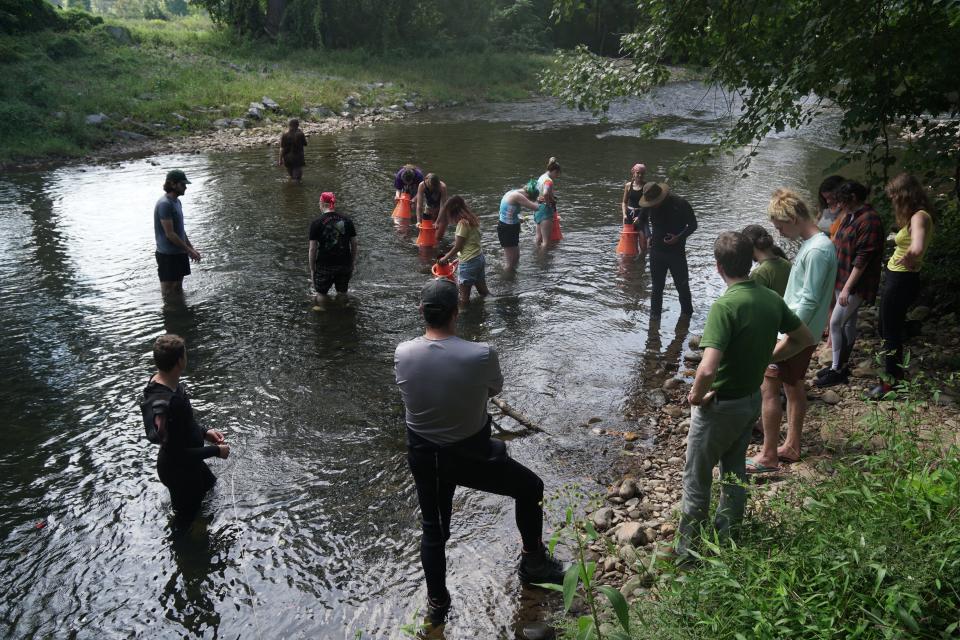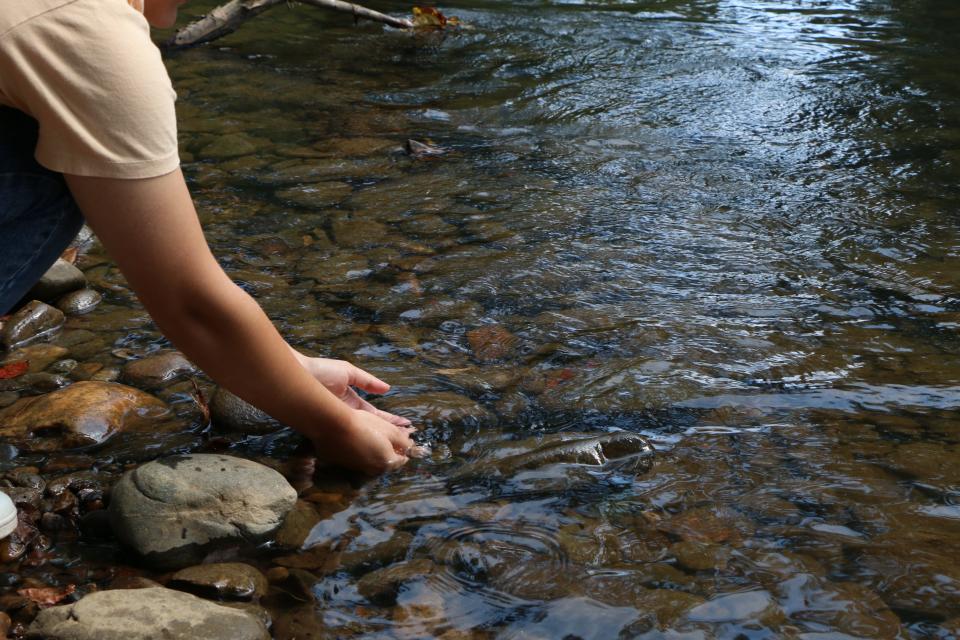Warren Wilson class helps reintroduce tangerine darter to Swannanoa River

A Warren Wilson College class has helped to reintroduce a species of fish into the Swannanoa River.
Taught by Associate Professor of Conservation Biology Liesl Erb, the class worked with Luke Etchison, the western region aquatic wildlife diversity coordinator for the North Carolina Wildlife Resources Commission.
Erb said she regularly reaches out to Etchison to see what projects he is working on and how her classes can help. For this project, Erb’s class helped reintroduce the tangerine darter into the Swannanoa River.
“We’ve been working with him and the Swannanoa since it runs through campus to try to return freshwater mussels and fish and fish species to the Swannanoa River,” Erb said. “While there’s still a lot of threat to our rivers that are important to keep fighting and protecting against, it’s really important to also realize that a lot of the same threats from the early 1800s and 1900s have gotten a lot better and so our streams and the habitats are kind of improving.”
According to Etchison, the tangerine darter is the largest darter species in the state, growing up to 6 inches. When breeding, the males turn a bright orange.
Instructor of biology at Warren Wilson College Patrick Ciccotto said the tangerine darter was eliminated from the Swannanoa River because of poor land management practices.
Etchison said this project started in 2021 when his team would collect adult tangerine darters and move them into the Swannanoa River near Mills River and in the upper French Broad River near Rosman. He said the fish are collected from the Pigeon River because the population there is strong.
Etchison said it is better to move wild fish rather than those in a hatchery because it helps preserve diversity in the population.

“As far as conservation goes, the hatchery approach is more of a last-ditch effort when you don’t have a strong enough population to move animals,” Etchison said. “If you have a good population, translocating them is the best option because it preserves natural genetic diversity.”
Etchison said tangerine darters are important to the ecosystem because they help mature the freshwater mussels in the area. He described the mussels as the “livers of our rivers” because they help filter the water. Without tangerine darters, the mussels cannot reproduce.
Erb said it’s important to know that every species in a river helps keep it clean.
“We don’t always realize that all the species are contributing to making that clean, beautiful river system,” Erb said. “Freshwater mussels actually filter the water, they pull out E. coli and other toxins and fish are balancing that ecosystem and eating algae and eating insects and keeping things in a balanced state.”
Etchison said the next step in the project is to tag the fish and use them to keep a watch on how healthy the water is, which he said is the best way to gather this information.
“It gives you an idea of how healthy the stream is,” Etchison said. “You can go out and get a water sample, but that just gives you a single moment in time. If you can go out there and see what fish are there and what their composition is, you can tell it’s a long-term view of the health of that stream.”

Ciccotto said having clean water in rivers is important, and native species help keep it that way.
“I think we can really link the presence of our native species to water quality,” Ciccotto said. “Everyone agrees that we want clean water, and a big component of that is having the species that are naturally present in the area being able to participate in their ecosystem roles.”
Etchison said while conditions in the French Broad River and its watershed are not perfect, they have certainly improved now that there are dedicated efforts to keeping it clean.
“The French Broad River and watershed in general gets a lot of negative attention all the time,” Etchison said. “I think it’s really important that we look at where we came from, and even though there’s plenty of room for work and there’s plenty of places that maybe have gotten worse over the last 10 or 20 years, if you look at the last 50 years, we are way better off than we used to be.”
For Erb and her classes at Warren Wilson College, she said she hopes the be part of the solution, not the problem.
She said it takes effort from everyone and that everyone is upstream and downstream of somebody else.
“We hope that the impact we have by doing some things to restore the ecosystem at Warren Wilson helps people downstream In the French Broad watershed,” Erb said. “We are grateful to the folks working upstream.”
This article originally appeared on Asheville Citizen Times: Class helps reintroduce tangerine darter to Swannanoa River

